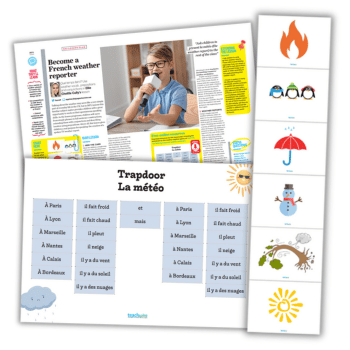This French weather vocabulary download for KS2 contains:
- 2 PDF lesson plans
- Weather flashcards
- Worksheets
- Weather phrases game
French weather vocabulary lesson 1
Learn meteorological vocabulary and use French prepositions and conjunctions in this KS2 French weather vocabulary lesson from Ellie Chettle Cully…
Talking about the weather may seem like a very simple part of everyday life in the UK, but in MFL lessons this familiar subject matter provides children with a great opportunity to work on their spontaneous speaking skills.
As the lesson progresses, children will move from simple phrases to full-sentence constructions, extending them with conjunctions and describing location using prepositions. Above all, this lesson gives children a real purpose for speaking: the creation of a spoken TV weather report.
It could easily be adapted to suit languages other than French.
What they’ll learn
- Use a variety of French weather vocabulary
- Respond to the question quel temps fait-il?
- Use prepositions to talk about the weather in different parts of France
- Extend sentences with conjunctions
- Speak more confidently in French through the creation of a weather report role play
French weather vocabulary starter activity
Explain how to ask what the weather is like in French (quel temps fait-il?) and some possible responses, such as:
- Il fait chaud (hot)
- Il fait froid (cold)
- Il pleut (rainy)
- Il neige (snowy)
- Il y a du vent (windy)
- Il y a du soleil (sunny)
- Il y a des nuages (cloudy)
Use the flashcards included in this download. Each features a symbol representing the above weather phrases.
Show pupils a card and say a phrase at the same time. If the phrase matches the image the children should repeat it back to you.
If it’s incorrect, they should put their finger on their lips and remain silent. Keep score to make it competitive.
Ellie Chettle Cully is a qualified primary teacher and primary languages specialist. Follow her on Twitter at @eccmfl. Visit her website at myprimarylanguagesclassroom.com.
French weather vocabulary lesson 2
Help KS2 pupils navigate talking about the weather confidently in French with this lesson plan from Dr Amanda Barton…
There’s nothing we love more in the UK than talking about the weather, and as a teacher, if you make it to lunch without having discussed the topic at least five times, you’re doing pretty well.
The upside of this is that it’s an ideal conversation to fit into your daily classroom routine, and therefore a great way to embed modern foreign languages (MFL).
Each morning, ask the children for the day, date and weather in your chosen MFL – the activities here are in French but they work for any language. You can review the weather after morning break or lunch, giving pupils lots of opportunities to practise.
What they’ll learn
- Say what the weather is like as part of the daily routine
- Techniques including miming, songs and games to memorise new vocabulary
- Practise listening and writing skills in French
- Use geography to describe the weather in different places
Starter activity
Tell the children you want to see how good their memories are. Ask them in English what the weather is like today, what it was like yesterday, the day before that, last July, in autumn, at the weekend, at Christmas, and so on.
This should give you a good range of weather phrases. Explain that you’re going to add an extra challenge to the morning routine. Can the class work out what it is?
Say the day, date and then the weather in French. Ask what their new challenge will be and if anyone can translate the weather phrase into English.
Weather phrases game
This download includes an illustrated PDF of key French weather vocabulary and their English translations, and a template for a ‘match the pairs’ card games on French weather.
Use this in isolation or alongside Amanda’s French weather lesson plan for KS2.
Dr Amanda Barton is a freelance writer and educational consultant who has taught MFL in primary and secondary schools. She is co-author of Teaching Primary French and Teaching Primary Spanish (Bloomsbury).











